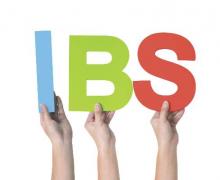CHICAGO – For patients with irritable bowel syndrome, expressing rather than bottling up negative emotions may be just what the doctor ordered, according to Elyse R. Thakur, Ph.D.
A novel psychological intervention designed to elicit negative emotions was associated with a significantly greater reduction in IBS symptom severity at 4 weeks than standard medical care (mean, 3.62 vs. 4.68; P = .004) and reductions similar to those seen with relaxation training (mean, 3.62 vs. 4.16; P = .126).
By 12 weeks, there were no differences between groups, and all patients continued to improve, Dr. Thakur of the DeBakey VA Medical Center and Baylor College of Medicine in Houston reported at the meeting sponsored by the American Gastroenterological Association.
One patient who had IBS-related nausea off and on for years wrote after Emotional Awareness and Expression Training (EAET): “I feel lighter, and after the exercise to deal with a particularly traumatic event, I feel less angry and less tense. I can’t say that my IBS is completely gone, but the symptoms have definitely gotten better.”
Psychological interventions for IBS have traditionally emphasized suppressing negative emotions such as anxiety and sadness through psychophysiologic strategies such as relaxation training (RT).
Recent research, however, suggests this suppression may be counterproductive. In a study involving 47 healthy controls, self-reported anger suppression predicted greater pain intensity in response to the cold pressor ice water immersion test (Ann Behav Med. 2010 Jun;39[3]:211-21).
While at the Wayne State University stress and health lab in Detroit, Dr. Thakur and her then graduate school adviser Mark Lumley, Ph.D., opted to take a different tact and developed the EAET based on the principle that emotional awareness and suppression can lead to stress-related symptoms and a dysregulated brain-gut system.
The goal of the intervention is to help patients reduce stress by having them learn about connections between stressful life experiences and physical symptoms; by teaching them to identify, experience, and express their emotions related to these stressful situations; and by encouraging them to engage in healthy emotional and interpersonal behaviors in their daily lives, including assertive and genuine communication, Dr. Thakur explained.
To facilitate this process, patients undergo a life-history interview, which helps them connect their IBS episodes to their life experiences. The therapist then conducts experiential exercises such as role playing and imagery to help patients engage with their avoided feelings, behaviors, memories, and relationships through their tone of voice, words, and body language. Finally, patients are encouraged to communicate more genuinely in their relationships, she said.
To evaluate the intervention, 106 patients who met the Rome III IBS diagnostic criteria were recruited from the community and gastroenterologic clinics, and evenly randomized to standard medical care or three 50-minute individualized sessions per week of EAET or RT including progressive muscle relaxation, relaxed breathing skills, and guided imagery. Patients had to have at least moderately severe IBS symptoms at least 2 days per week at the time of screening. Their mean age was 36 years, 80.2% were female, and 65% were of European-American descent.
Outcomes were measured at 4 and 12 weeks by using the IBS Symptom Severity Scale, Brief Symptom Inventory, and IBS Quality of Life questionnaire.
At 4 weeks, EAET and RT significantly reduced anxiety (mean, 0.71 and 0.62 vs. 1.16; P = .003 and P = .001, respectively) and hostility (mean, 0.56 and 0.60 vs. 0.89; P = .013 and P = .029, respectively), compared with controls, Dr. Thakur reported in a poster at the meeting.
“These findings suggest that techniques that enhance awareness, experiencing, and expression of negative emotions resulting from life stress and psychological conflicts are as effective in reducing anxiety and hostility as somatic control techniques,” she said in an interview.
RT significantly reduced depression, compared with standard care (mean, 0.52 vs. 1.02; P = .002), while EAET did not (mean, 0.77 vs. 1.02; P = .119).
This finding was unexpected, “albeit in retrospect, not surprising because emotional processing interventions often negatively impact the moods of people, at least in the short term, as they deal with the newfound awareness of their conflicts,” Dr. Thakur explained.
At 12 weeks, EAET and relaxation training maintained the improvements in anxiety and hostility, but the differences were no longer statistically significant because the standard care group improved, she noted.
Poor quality of life was significantly less common among patients receiving EAET and RT than standard medical care at 4 weeks (mean, 2.12 vs. 2.22 vs. 2.61; both P values less than .001) and 12 weeks (mean, 1.98 vs. 2.04 vs. 2.39; P = .004 and P = .016, respectively).

